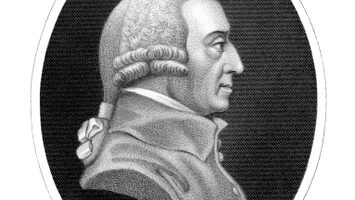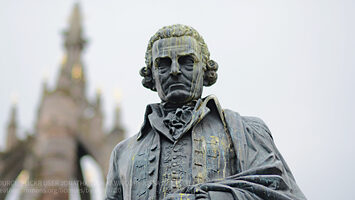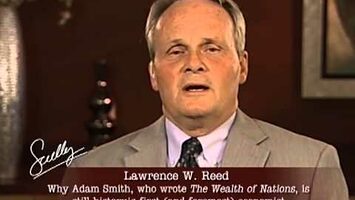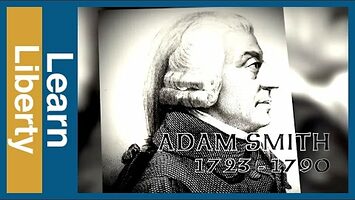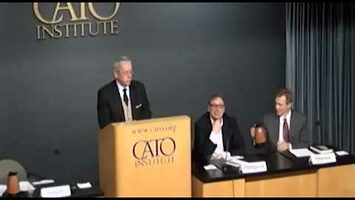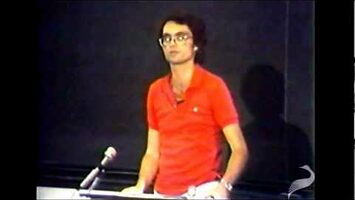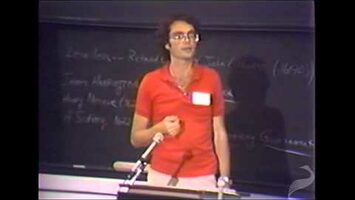Smith, Adam (1723-1790)
Encyclopedia
Both a philosopher and political economist, Adam Smith was one of the principal thinkers of 18th-century Scotland, whose name is intimately associated with the early history of economic science. He was born in Kirkcaldy, Fife, in the late spring of 1723—the exact date is unknown—and was baptized on June 5, 1723. The son of the comptroller of the customs at Kirkcaldy, who died 5 months before his birth, Adam was educated in the grammar school there. At the age of 15, he was sent to the University of Glasgow, where he studied moral philosophy under Francis Hutcheson, one of Scotland’s greatest thinkers, and in 1740, he entered Balliol College, Oxford, as an exhibitor (i.e., as a student possessed of a scholarship). Smith’s interest in the philosophical system put forward by his fellow Scotsman David Hume, whose Treatise of Human Nature was published in 1739–1740, clashed with the Aristotelian epistemological and metaphysical presuppositions that dominated Oxford thinking, and Smith soon determined to leave England.
In 1746, he relinquished his scholarship and embarked on a series of public lectures at Edinburgh under the patronage of Henry Home, Lord Kames, Scottish attorney and philosopher. Kames, who was already regarded as an important scholar in the history of law and theoretical history, was impressed with Smith and undertook to sponsor Smith’s lectures on rhetoric and belles-lettres. The lectures were well received and led to Smith being offered the chair of logic at the University Glasgow in 1751. In the following year, Smith was appointed to the more remunerative professorship of moral philosophy, a post earlier held by Hutcheson, in which he remained for the next 13 years. During his tenure at Glasgow, Smith published his first work, A Theory of Moral Sentiments, which appeared in 1759.
In A Theory of Moral Sentiments, Smith addresses the following question: From whence springs our ability to condemn certain intentions and actions as immoral and approve others as morally worthy? This problem is especially vexing inasmuch as we are able to judge our own behavior as either moral or immoral despite the fact that we are strongly motivated to act in our own self-interest. Smith maintained that our ability to form moral judgments is a function of our being possessed of a basic moral faculty that motivates us to act as an impartial spectator of our own and others’ actions. This moral sense, which Smith labeled sympathy and which is not reducible to our rational faculties, allows us to see ourselves as others see us and, thus, permits us to live harmoniously with others despite our being self-regarding and passionate in our own interests. It serves not only to promote our own well-being, but to bring our actions into line with a society of other moral individuals, thus contributing to the happiness of mankind. Adumbrating his discussion of the economic benefits that follow from individuals acting in their own self-interest in Wealth of Nations, Smith notes in the Theory of Moral Sentiments that even those members of society who have profited most from their selfishness act as if “they are led by an invisible hand … , without intending it, without knowing it, [to] advance the interests of society.”
Smith left academic life in 1764, at the age of 41, to assume the position of tutor to the young Duke of Buccleugh. He accompanied the Duke on a Grand Tour of the Continent, which provided him with the opportunity of meeting some of the greatest minds in Europe. During a 2-month stay in Geneva, Smith conversed at length with Voltaire. Thanks in large part to his friendship with David Hume, who was at that time secretary to the British Embassy in Paris, Smith was able to gain access to the various salons, where he was able to meet the leading minds of the French Enlightenment, among them Jean-Jacques Rousseau, the Physiocrat economist François Quesnay, and Anne-Robert-Jacques Turgot. In addition, while traveling through Europe, Smith had the leisure to begin work on what would eventually become his most important book, the Wealth of Nations. On their return to London in October 1766, Smith worked with Lord Charles Townsend, the stepfather and guardian of the Duke of Buccleugh and future chancellor of the exchequer. It was during this period that Smith expanded his circle of acquaintances to include Edward Gibbon, Edmund Burke, and Samuel Johnson and was elected to the Royal Society.
As a result of his service to the Duke, Smith was granted a generous life pension of £300 per year, on which, in 1767, he retired to his birthplace of Kirkcaldy, just across the Firth of Forth from Edinburgh. There Smith spent the following 6 years working on Wealth of Nations. In 1773, he moved to London, where he completed his monograph on the production and distribution of wealth for which he is now famous. On March 9, 1776, An Inquiry into the Nature and Causes of the Wealth of Nations was published in two volumes by William Strahan and Thomas Cadell. Although originally the work was regarded as an important one only among a small group of readers, several decades after its publication, it established itself as a classic and came to be regarded as one of the most important books to appear during an age that had given birth to some of the greatest achievements of the human intellect.
In Wealth of Nations, Smith succeeds in laying bare the intellectual framework of economic science while marrying his theoretical discussions to a substantial amount of empirical data. Smith’s analysis of the benefits that follow from the division of labor, the fallacies of mercantilism, and the destructive effects of almost all restrictions on market forces are comprehensive and accompanied by a mass of illustrations that trace the operation of the laws of economics. Indeed, so extensive is his commentary and so intense his defense of free trade and unrestricted markets—despite his few reservations—that it is no surprise that the work was eventually hailed as a classic of promarket literature. However, despite the reputation the book was to achieve, it was not the first treatise in economics. The Principles of Political Oeconomy by Sir James Steuart, published in 1767, although it espoused a particularly toxic form of mercantilism, predates Wealth of Nations, as does Richard Cantillion’s Essai sur la nature du commerce en général, published in 1755, but written some 25 years earlier. The fact is that most of Smith’s insights into the mechanisms by which societies produce and distribute wealth had been reached by other thinkers prior to the publication of the Wealth of Nations, among them Cantillion, Quesnay, Turgot, David Hume, and, above all, his own teacher, Francis Hutcheson. Nevertheless, Smith has been accorded the honor of being the founder of economic science largely, it has been suggested, because he was able to build on and coordinate the various strains of economic analysis that had appeared before him and map this vast field of enquiry within the context of a sea of illustrative material.
Beyond affirming the benefits of free, unrestricted markets, Wealth of Nations probably offers the clearest statement that seemingly undirected market forces are in fact given coherence and direction by the existence of a spontaneously generated order that is the result of human action but not the product of human design. The notion that complex social arrangements take their shape as the unanticipated consequences of a myriad of uncoordinated human actions pervades Smith’s social theory and forms the philosophical underpinning of his economic theory. Wealth is produced and distributed, Smith argued, by virtue of the fact that the market constitutes a self-regulating mechanism producing complex patterns without the need of an orderer. It is as if, he maintains, economic interactions were directed by an invisible hand, by which men, seeking their own private gain, benefit society and thus promote an end that was no part of their intention. Indeed, the notion of an unfettered market is predicated on the idea that a socially beneficial ordered arrangement is likely to emerge out of the free actions of countless individuals, each aiming at the satisfaction of his own private ends. Equally important, intervening in the self-coordinating process that is the market thwarts it in his function of maximizing production and wealth. Smith writes,
By pursuing his own interest, he frequently promotes that of the society more effectually than when he really intends to promote it. I have never known much good done by those who affected to trade for the public good. It is an affectation, indeed, not very common among merchants and very few words need be employed in dissuading them from it.
Smith’s analysis of the laws governing economic interaction develops within the context of a broader discussion dealing with the evolution of social institutions that encourage the production of wealth, the foremost of which is private property. Societies, he wrote, naturally evolve through several stages, each marked by the primary method whereby wealth is produced, from an age of hunters to one of shepherds, from there to an age of agriculture, and finally to one of commerce. These changes come about as the unplanned result of innumerable individuals actions each having far more limited ends, the total effect of which is to transform the primary mode of production by which men live. With each change in the mode of production there follow changes in our moral rules and the laws that relate to property that structure our notions of private possessions, indeed the very framework of our political institutions. Thus, history is a progression from the primitive to the civilized and from the most rudimentary notions of property to those that prevail in modern society, which alone allow for the production of sufficient amounts of wealth to permit general prosperity.
Scholars have long argued over the seeming inconsistency between Smith’s argument in A Theory of Moral Sentiments and in Wealth of Nations, pointing to the fact that the first work is devoted to a discussion of the importance of a moral sensibility without which pacific human interaction would be impossible, whereas the second underscores that the most sensible economic policy, the one most likely to produce social wealth, is one that is predicated on the assumption that everyone acts in their own self-interest. A careful reading of the two works, however, indicates that there exists no real contradiction between them. Wealth of Nations is largely a treatise on economic policy and, as such, tends to discuss motivation in terms of self-interest. This focus on self-interest does not mean, as some seem to have concluded, that Smith abandoned benevolence as a fundamental motive force in human action in favor of an egoistic theory. Indeed, there is nothing contradictory in claiming that sympathy lies at the root of moral judgment and that men are motivated to act by, among other things, self-love. Nor should self-love, which, properly understood, refers to a regard for one’s personal happiness, be confused with selfishness, which precludes a concern for the welfare of others. In summary, the difference between Smith’s discussions in the two works is solely one of emphasis.
Following the publication of Wealth of Nations, Smith was honored with appointments both as commissioner of customs and commissioner of salt duties for Scotland, sinecures that brought him an additional £600 per year. This income, added to his pension from the Duke of Buccleugh, made Smith a wealthy man. Smith apparently enjoyed his newfound affluence inasmuch as he wrote nothing following the release of Wealth of Nations. He spent his final years in Edinburgh in quiet retirement, secure in the reputation as one of the leading figures of the Scottish Enlightenment. His health began to decline following the death of his mother in 1784, and he died in July 1790, the victim of a painful ailment. He is buried in the Canongate Churchyard in Edinburgh.
Further Readings
Campbell, R. H., and A. S. Skinner. Adam Smith. New York: St. Martin’s Press, 1982.
Fay, C. R. Adam Smith and the Scotland of His Day. Cambridge: Cambridge University Press, 1956.
Haakonssen, Knud. Science of a Legislator: The Natural Jurisprudence of David Hume and Adam Smith. Cambridge: Cambridge University Press, 1981.
Rae, John. Life of Adam Smith. London: Macmillan, 1895.
Scott, William Robert. Adam Smith as Student and Professor. New York: A. M. Kelley, 1965.
Stewart, Dugald. Biographical Memoir of Adam Smith. Vol. X of the Collected Works. Edinburgh: T. Constable and Co., 1958.
Polybius and the Origins of the Separation of Powers, written by Paul Meany
